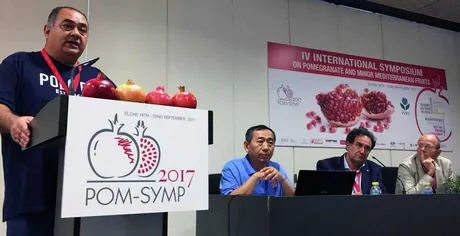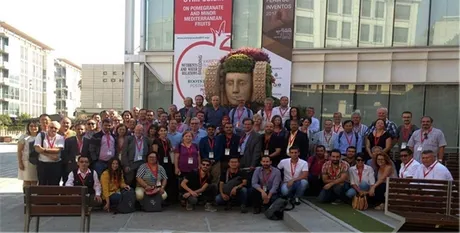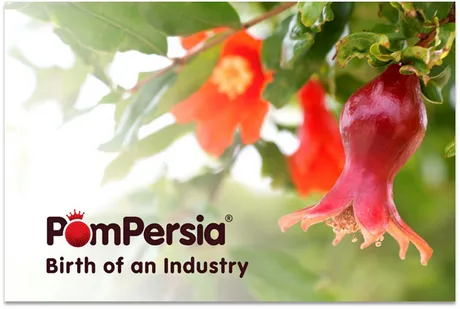South Australia will host a major science and research symposium in 2021, thanks largely to the work from PomPersia, which is aiming to expand the country's pomegranate industry.
The company represented Australia for the first time at the prestigious IV International Symposium for Pomegranate and Minor Mediterranean Fruits in September last year in Elche Spain, and was able to secure hosting rights for the sitting for the next event.
"This is the equivalent of the Olympics of science, to do with horticulture," PomPersia CEO Omid Rad said. "Our knowledge and work were the prelude to the International Society for Horticulture Science selecting Australia to host the next symposium, even though compared to other countries’ production and coverage, we wouldn't even be a bleep on the radar. We, as an organisation; an industry, and a pioneering nation, will be presenting our findings broadly in April 2021, when the Symposium finds its way to South Australia. Our growers, scientists, and all other parties involved continue in their tireless effort to put us all on the global pomegranate map."

Photo: Mr Rad addressing the pomegranate Symposium in Spain after PomPersia’s winning bid for Australia to host the next symposium
PomPersia seeks to help establish over 100 small and medium sized orchards throughout Australia within a decade with the aim of producing 30,000 tonnes of pomegranates bulk of which will be earmarked for export. The PomPersia CEO and the recently re-elected Australian Pomegranate Association (APA) president, Mr Rad, is working with all stakeholders including growers, distributors, academia, and various government bodies such as BioSecurity and AgriFutures to pave the way for Australia’s first sizeable export by 2025.
“We are working diligently on providing a memorable and exciting platform for the international delegation of scientists and other stakeholders in the business of pomegranates right here in Adelaide, South Australia,” said Mr Rad.
PomPersia holds the world's largest private collection of pomegranate varieties in the world. It does not farm as such, but empowers small and medium businesses by providing much needed expertise and varieties better suited to Australian climate. It has completed studies at 14 trial sites across Australia since 2010 to work out which varieties work best in what horticultural regions in Australia.
With the help of scientists from South Australia, New South Wales and further afield PomPersia is creating new region-centric genetic material for local and international markets. It began its R&D shortly after the nationwide outbreak of the dieback in Australia during 2013.
"The reason we did what we did, as PomPersia, was that nobody knew what was happening and what caused the dieback," Mr Rad said. "From all the scientific experts consulted here in Australia, the U.S, and Israel, nobody could put their finger on any particular cause; diseases, pathogens etc. It was actually a good thing to happen, as it happened very early in the piece and allowed the industry to regroup and regather its momentum."

Photo: Omid Rad and Dr M Hassani at the IV International Symposium for Pomegranates & Minor Mediterranean Fruits
Mr Rad says while there are still no definitive answers as to what caused the dieback, several lessons have been learnt from our research thus far and we are confident that the dieback is not the result of a diagnosable disease previously known to science but rather a culmination of a serious of conditions.
"We as a research organisation have an idea of what it is, and we are still working on it," he said. "To my absolute pleasure out of the 14 sites we tested - four of which we knew would fail, did fail, and the 10 we hoped wouldn't fail didn't. So that is part of the reason we are confident we have a good handle on what the problem is, and how to tackle it. In one farm over the course of four years we planted 17,000 young plants and managed to kill 15,000 of them over time. That may sound ridiculous and a waste of time and money, however, unless it fails repeatedly for the reason you have hypothesised, you don't have a scientific basis to declare it broadly."
Some of the findings have already been implemented at the newly established PomPersia plantations in Australia, and Mr Rad says there have been no trees affected by the 'dieback' at the new trial. Also, new varieties are being created that are envisaged to deal with the 'dieback', with the intention to form a super variety that is both resilient and commercially viable.

He adds that demand for pomegranates is increasing both within Australia and globally, especially organically grown produce. One of the main reasons is major health benefits of the fruit as well as the rise of the middle class in Asia, meaning more people with higher disposable incomes.
"Pomegranate has some fantastic qualities; firstly, there is one antioxidant that can only be found in pomegranates called Punicalagin," Mr Rad said. "Punicalagin is thought to be the natural cleanser of all the nastiness within your body. It helps get rid of gunk in your arteries, it helps regulate blood pressure, cholesterol, and blood sugar. It also plumps your inner and outer organs full of vitality. So, you may have heard of collagen, as an anti-ageing measure, to plump up your skin - Punicalagin is a natural way of doing this.”
Mr Rad says the international scientific research into the fruit is showing some promising findings.
“One study conducted by a Swiss research organisation found that once consumed, the bacteria in the gut will process the antioxidants in the pomegranate and create a molecule called ‘Urolithin A’ - this has been proven to prolong life in test subjects such as worms and mice, and is set to undergo human trials," he said. “As humans age, the process of recycling mitochondria (mitophagy) slows down, eventually coming to a halt. Mitochondria is what keeps us going. It, for want of a better analogy, is the body’s power generator. The Swiss scientists identified a molecule that re-establish the cell’s ability to recycle the components of the failing mitochondria. Thus far, Urolithin A seems to be the only molecule known to science with the propensity to reactivate mitophagy. This process has promising implications for combating age-related ailments such as Alzheimer’s disease. We at PomPersia are doing our part in delivering the best Australia has to offer when it comes to pomegranates.”
The official website for the 2021 Symposium is being developed and PomPersia hopes to launch it in the near future at: www.AusPom21.com, however until the site is unveiled, all queries can be directed to:

Omid Rad
PomPersia
Phone: (+61) 1300 880 044
getstarted@pompersia.com.au
www.pompersia.com
